STATEHOUSE REPORT | ISSUE 23.43 | Oct. 25, 2024
BIG STORY: Polls for 2024 presidential race are a toss-up
MORE NEWS: Early S.C. voting setting records, more
LOWCOUNTRY, Ariail: Don’t give him the keys
COMMENTARY, Brack: Standing up to pressure to keep elections honest
SPOTLIGHT: AT&T
MYSTERY PHOTO: Old stores
FEEDBACK: Send us your thoughts
Explainer: Polls show toss-up for 2024 top race

By Jack O’Toole, Capitol bureau | With a presidential election that both sides are calling one of the most momentous in American history now only days away, partisans of Team Red and Team Blue are scouring polling data for even the slightest hint their side is going to win.
But given the closeness of this year’s race between Vice President Kamala Harris, a Democrat, and former GOP President Donald Trump, pollsters say such scrutiny is a fool’s errand.
“When every poll is this tight – when every poll is within the margin of error – that’s why we use the phrase ‘toss-up,’” Winthrop University pollster and political scientist Scott Huffmon told the City Paper in an Oct. 21 interview.
Focus on the right things
What’s more, he said, many voters are looking at the wrong polls anyway.
“The thing that matters most is, stop obsessing about the national polls,” Huffmon said. “National polls may show a trend, but because of the way the Electoral College works, it really just comes down to about seven states, so pay attention to quality polls from those battleground states.”
In 2024, the seven swing states – that is, the states that are actually thought to be competitive – are Arizona, Georgia, Michigan, Nevada, North Carolina, Pennsylvania and Wisconsin.
But at a moment when political misinformation, including biased polling data, is rampant on the internet and social media, how can news consumers distinguish between “quality polls” from those states and the junk polls that keep creeping into their feeds?
According to Huffmon, this is a case where traditional, or “mainstream,” media brands deserve the highest level of trust – because accuracy is key to their credibility.
“Any legitimate national media, whether they lean right or lean left, want to get the results correct,” Huffmon said, pointing to outlets like The New York Times, CNN and Fox News, whose data unit was the first to correctly call Arizona for Biden on election night in 2020. “And because of that, because they want to be right, they’re not going to bias their polls.”
Beyond that, experts say, there are poll aggregators – websites like FiveThirtyEight and Real Clear Politics – that combine the best polls into an average result that should, in theory, reduce the risk of major error.
But even after you’ve found quality polls from reliable sources, experts say it helps to know a bit about how they report their results if you want to read one like a pro.
Polling 101
These days, most people who care about politics have at least a rudimentary understanding of how polling works: Contact a representative sample of Americans – say a thousand people – ask them how they’re going to vote, apply a little statistical magic and report the results.
If you do it right, you should end up with a snapshot of public opinion at the current moment that’s accurate within a specified margin of error – plus or minus three points, for instance, with a sample size of 1,000 people – to a 95% degree of confidence. In other words, with a sample that’s that big, there’s a 95% chance the results are within three points of what the poll says.
But pollsters say it’s important for news consumers to understand exactly what those terms mean before they start drawing conclusions – mainly because there’s leeway built in
First, they say, a snapshot is just that – a picture of public opinion at a specific moment in time. Today’s undecided voters are tomorrow’s margin of victory for one campaign or the other.
Second, the margin of error doesn’t apply to the spread between the candidates. Rather, it applies to every number in the survey. For example, if Candidate A is at 52% and Candidate B is at 48% in a poll with a three point margin of error, Candidate A could be ahead by as many as 10 points or behind by one. In other words – and somewhat counterintuitively – a four-point race with a three-point margin of error is, in fact, within the margin.
Moreover, the margin of error is not consistent across all results. For example, a typical poll of 1,000 Americans would include about 150 Black men and women, meaning that results from that subgroup, or crosstab, have a greater margin of error of about 10 points because the subgroup was a smaller number of respondents.
Finally, the 95% confidence level tells poll readers that 5% of the time, the poll will not be within the margin of error. So five out of every 100 polls conducted is likely to be wrong.
Trump and the challenges of modern polling
Even before Trump burst on the scene in 2015, political pollsters were struggling to find and survey representative samples of voters.
“There used to be two ways to reach people – call them on the phone or get them to answer a written survey,” South Carolina-based pollster Carey Crantford told the City Paper. “But those have now been eclipsed by cell phones and texts and emails, and that’s impacted electoral surveys significantly.”
Put simply, it’s harder to reach people than it was 15 or 20 years ago, when all you had to do was call their land line. And even worse, the people pollsters can reach most consistently using these newer methods aren’t necessarily fully representative of the population.
As a result, the polls in both 2016 and 2020 were off by some degree, especially in the swing states, underestimating Trump’s strength in both elections.
“The biggest issue was the underrepresentation of white male and non-college voters,” Crantford said, noting that these were two key Trump constituencies. “So pollsters have been trying to [account for that] by modeling their sample [and] tying the results of the future to the results of the past.”
In other words, most pollsters this cycle are massaging, or “weighting,” their results to make their sample look more like the one that actually turned out to vote in 2020.
And according to Crantford and Winthrop’s Huffmon, that’s the single biggest question with regard to current polling on the race: Is weighting results by so-called “recalled vote” a real solution to pollsters’ longstanding problems measuring Trump’s support, or is it causing them to miss changes in the makeup of this year’s electorate?
“For example,” Huffmon said, “if suburban women change their vote because of Roe v. Wade being overturned, that’s not going to show up as strongly as it should when you weight by previous vote.”
But in the end, no matter how hard they try to get it right, pollsters say you can’t be sure about anything when Harris and Trump are locked in a virtual dead heat in nearly every poll.
“We may be asking too much of polling these days,” Crantford said. “The utility of the tool is really in what you use it for.”
- Have a comment? Send to: feedback@statehousereport.com.
Early S.C. voting setting records, more
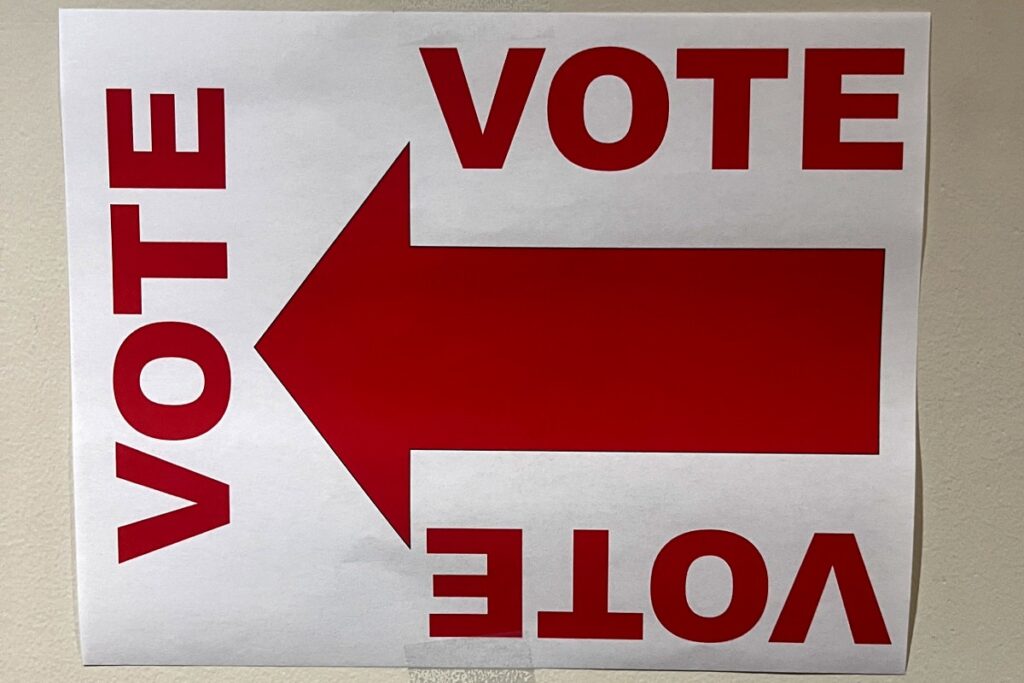
By Jack O’Toole, Capitol bureau | South Carolinians are turning out to vote early in record numbers with new daily records set during each of the first three days of early voting this week, according to tallies from the S.C. Election Commission.
“There’s no need to wait until Nov. 5 to vote,” S.C. Election Commission Executive Director Howard Knapp said in a press release. “Find an early voting center in your county. Vote just like you would at your polling place on Election Day, and have your voice heard.”
By the close of business Wednesday, almost 400,000 Palmetto State residents had heeded that call, reportedly braving parking problems and long lines at many early voting sites to cast their ballots for president, state legislature and county offices.
“Everybody thought they were going to beat the crowd on the first day, but it turned into a crowd everywhere,” Horry County election official Sandy Martin told the Post and Courier. “If you drive by our office, you’re going to think it’s Walmart.”
In Charleston County, about two-thirds of voters are expected to vote early, according to Isaac Cramer, executive director of the county’s Board of Elections and Voter Registration. Projections were for 140,000 early voters out of 225,000 ballots expected to be cast in the county.
South Carolina’s early voting period runs through Nov. 2. For a full list of voting locations and requirements, visit the S.C. Election Commission website at scvotes.gov.
In other state election news this week, an Oct. 25 hearing date was set for a lawsuit by the ACLU of South Carolina demanding that almost 2,000 young people be added to the state’s voter rolls. The suit stemmed from a reported computer error by the S.C. Department of Motor Vehicles (SCDMV) that voided their voter registrations.
The teens, who were not yet old enough to vote but would turn 18 before election day, registered legally at SCDMV offices under the federal “motor voter” law, which has required states to offer voter registration services to all eligible residents when they apply for or renew a drivers license since 1993.
McMaster signs prison cell phone ban into law
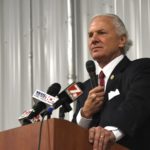
When Gov. Henry McMaster signed a new law this week outlawing unauthorized cell phone possession by prison inmates, no one was happier than the retired corrections official for whom the bill was named.
“I’m overjoyed,” said former Lee Correctional Institution Capt. Robert Johnson, who was shot six times at his home in 2010 after inmates arranged the attack using a contraband cell phone. “I think we need to do all we can to stop inmates from having access to contraband phones and to help support our correctional staff. I thank them for pushing the legislation through.”
McMaster touted the state’s “tremendous progress” in shutting down unauthorized cell phone use by prisoners as he ceremonially signed the Capt. Robert Johnson Act into law Tuesday.
Under the new law, violators will face up to five additional years in prison for possession of a contraband cell phone and up to 10 years if the phone is used in connection with a crime.
In other recent news
![]() S.C. ranks dead last in energy efficiency, study says. October is National Energy Awareness month, a fact not well-known during a time when climate issues continue to garner discussion, according to a study conducted in September by finance analysts at WalletHub. Energy efficiency is simply not taken as seriously as other issues, especially in the Southeast, the study suggests.
S.C. ranks dead last in energy efficiency, study says. October is National Energy Awareness month, a fact not well-known during a time when climate issues continue to garner discussion, according to a study conducted in September by finance analysts at WalletHub. Energy efficiency is simply not taken as seriously as other issues, especially in the Southeast, the study suggests.
Not enough students in S.C. are graduating with in-demand degrees. South Carolina colleges aren’t graduating nearly enough teachers or nurses to keep up with demand in those fields, and about half of engineering students are leaving the state after graduation, according to a Daily Gazette analysis of data from the state Commission on Higher Education.
S.C. health agency sets drug take-back day for Sunday. The South Carolina Department of Public Health announced the second drug take-back day of the year taking place on Oct. 26. The purpose of the day is to clean out and properly dispose of unused or expired medications. Nearly 50% of abused prescription drugs come from family and friends, including from home medicine cabinets, according to the U.S. Drug Enforcement Agency.
S.C. meteorologists react to weather conspiracies after Helene. Meteorologists in South Carolina say that the prevalence of weather conspiracy theories and misinformation this hurricane season was the worst they’ve ever seen.
S.C. renters have little legal protection from mold. It’s getting worse. South Carolina is hot, stormy and humid; environmental factors which favor mold growth, and which will likely worsen as the Earth warms. But neither the state nor federal government have specific safety standards for mold growth in rental housing.
McMaster fills seat of USC’s longest-serving board member with trustee’s daughter. Eddie Floyd, the longest-serving member and former chairman of the University of South Carolina board of trustees, has quietly retired. McMaster has appointed Floyd’s daughter, Coleman Floyd Buckhouse, to fill his seat.
Commission works to determine location, design of Robert Smalls monument. South Carolina is preparing to put up its first individual statue for an African American on its Statehouse lawn, honoring Robert Smalls, who put on Confederate clothes in order to steal a slaveholder’s ship and sail his family and a dozen others to freedom during the Civil War.
S.C.’s social services chief to step down. Michael Leach, director of South Carolina’s child-welfare agency who took over the department in 2019 amid high turnover and heavy caseloads, will step down next year.
S.C. death row inmate picks lethal injection. Convicted murderer Richard Moore, scheduled to be executed by the state of South Carolina on Nov. 1, picked lethal injection as his method of execution. Moore is appealing the execution to the U.S. Supreme Court.
Don’t give him the keys
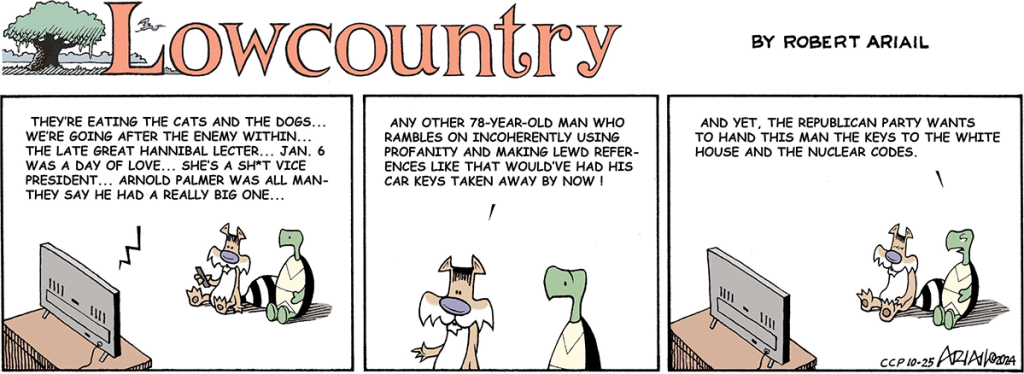
Nationally award-winning cartoonist Robert Ariail always has an interesting take. This week, he takes on lots of reasons that former President Donald Trump shouldn’t be elected president again.
What do you think … love it or hate it? Did he go too far, or not far enough? Send your thoughts to feedback@statehousereport.com.
Standing up to pressure to keep elections honest
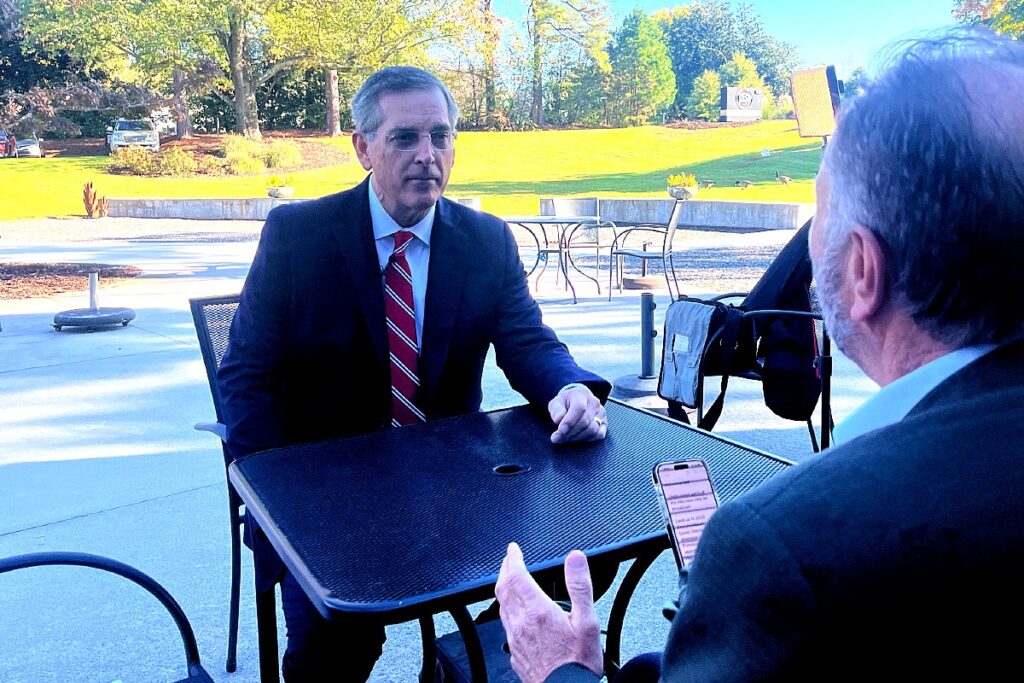
By Andy Brack | It’s the second day of a new year just after a presidential election and you pick up the phone. At one point, the guy on the other end of the line says, “All I want to do is this: I just want to find 11,780 votes, which is one more that we have because we won the state.”
 The guy on that Jan. 2, 2021, call was the president of the United States, Donald Trump. He was putting pressure on Georgia’s top election official, Republican Secretary of State Brad Raffensperger, to “find” enough votes to prevail in the Peach State over Democratic candidate Joe Biden. Trump even threatened a criminal prosecution.
The guy on that Jan. 2, 2021, call was the president of the United States, Donald Trump. He was putting pressure on Georgia’s top election official, Republican Secretary of State Brad Raffensperger, to “find” enough votes to prevail in the Peach State over Democratic candidate Joe Biden. Trump even threatened a criminal prosecution.
The whole mess put Raffensperger in a very uncomfortable spot because he wanted to do his job – reporting votes accurately and reporting the numbers for what they were, without deceit, subterfuge or obfuscation.
“I’m an engineer. I’m real good with math,” Raffensperger said earlier this week in an interview outside of Atlanta. “So with elections, there’s no integrals, no double integrals, no Laplace transform of a Fourier wave series. It’s just adding up numbers. We don’t even have to subtract, divide or multiply – so that’s grade school (math). But we have a process in place and we know that our elections are safe, they’re secure and they’re accurate.”
Still, the pressure from the Trump White House – attempted coercion that ended up getting Trump in trouble with Georgia prosecutors and was part of an article of impeachment in the U.S. House – was intense.
“It was an interesting moment, somewhat surreal,” Raffensperger reflected. “We never expected this to happen. But I think sometimes you know things happen for a reason, but you are called to do your job – no matter what. And that’s what I wanted to do. And I also wanted to make sure that I was respectful to the office of the President of the United States of America.
“Because I think really what we see right now … throughout the world is people should be respectful of people who hold positions of authority.”
And he said he believes that’s what is at stake these days in America. Americans may be risking the ability to compromise and talk respectfully about issues on which they don’t agree.
“People should talk to each other respectfully,” he said. “I think when we lose that, I think we’re losing something within ourselves.
“We can have strong conversations and just say, by George, I disagree with you on that, but we don’t have to pull out our swords. We don’t have to pull out our muskets. We don’t have to have duels. We can settle that. We are in America. We are in a representative republic.”
Since the 2020 election, Georgia election officials have worked to improve the voting process and smooth a few past snafus.
Raffensperger said he expects results comparatively quickly this year because Georgians seem to like early voting. While about 5% of ballots are expected to be mailed absentee ballots, more than 2 million Georgians have already cast early ballots. By election day, some 70% of the electorate is expected to have voted, which will take a lot of last-minute pressure off voting precincts. The fate of the state’s electoral votes – unless the election is within 1,000 votes or so – may be known by midnight, he said.
In South Carolina, the story on early voting is similar. It’s expected to speed reporting of results. Election officials in the Palmetto State say up to two-thirds of voters could head to the polls early.
As you listen to returns on election night, think about all of the Brad Raffenspergers out there who operate with integrity and know that voting in America is solid because it is done with a proven process, not with reckless abandon.
Andy Brack is editor and publisher of Statehouse Report and the Charleston City Paper. Have a comment? Send to: feedback@charlestoncitypaper.com.
AT&T
 The public spiritedness of our underwriters allows us to bring Statehouse Report to you at no cost. Today’s featured underwriter is AT&T Inc.
The public spiritedness of our underwriters allows us to bring Statehouse Report to you at no cost. Today’s featured underwriter is AT&T Inc.
AT&T Inc. (NYSE:T) helps millions around the globe connect with leading entertainment, mobile, high speed Internet and voice services. We’re the world’s largest provider of pay TV. We have TV customers in the U.S. and 11 Latin American countries. We offer the best global coverage of any U.S. wireless provider*. And we help businesses worldwide serve their customers better with our mobility and highly secure cloud solutions.
- Additional information about AT&T products and services is available at http://about.att.com.
- Follow our news on Twitter at @ATT, on Facebook at http://www.facebook.com/att and YouTube at http://www.youtube.com/att.
* Global coverage claim based on offering discounted voice and data roaming; LTE roaming; voice roaming; and world-capable smartphone and tablets in more countries than any other U.S. based carrier. International service required. Coverage not available in all areas. Coverage may vary per country and be limited/restricted in some countries.
Old stores
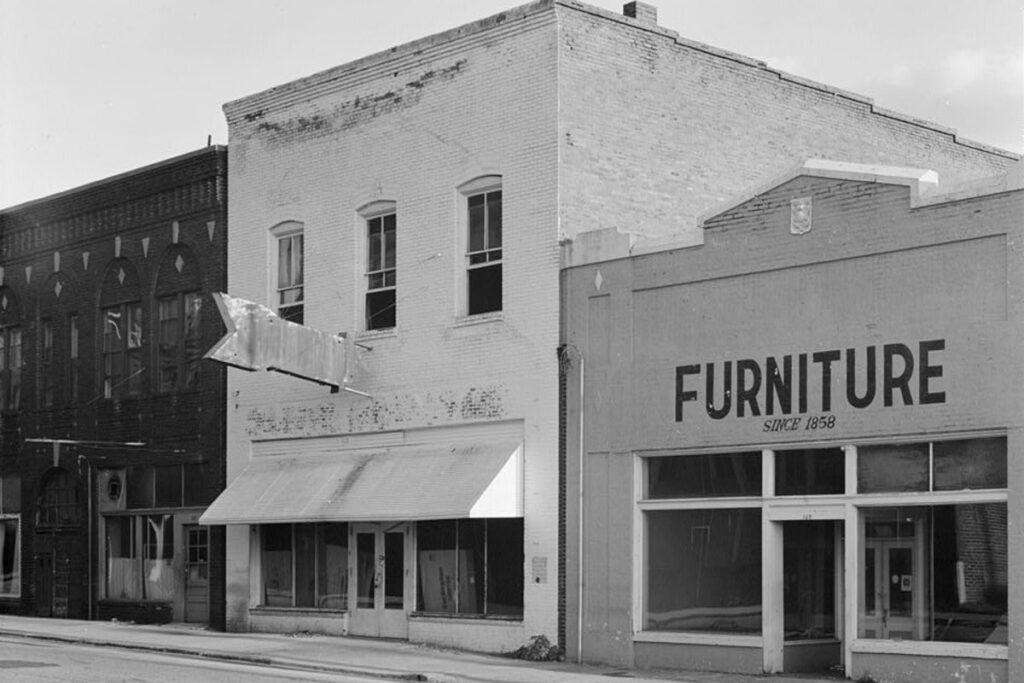
Here are two stark stores somewhere in South Carolina. What and where are they? Send your name, hometown and guess to: feedback@statehousereport.com.
 Last week’s mystery, “Pretty empty street,” is an old photo of the Old Brick Warehouse in Mullins. “Demolished in 2014, it was once used as a tobacco warehouse and located at the corner of East Wine Street and North Main Street,” wrote reader George Graf of Palmyra, Va. Allan Peel of San Antonio, Texas, added that the building, constructed between 1903 and 1908, was listed on the National Register of Historic Places in 1984 but demolished in 2014.
Last week’s mystery, “Pretty empty street,” is an old photo of the Old Brick Warehouse in Mullins. “Demolished in 2014, it was once used as a tobacco warehouse and located at the corner of East Wine Street and North Main Street,” wrote reader George Graf of Palmyra, Va. Allan Peel of San Antonio, Texas, added that the building, constructed between 1903 and 1908, was listed on the National Register of Historic Places in 1984 but demolished in 2014.
Others who correctly identified the area were: Truett Jones of Summerton; David Lupo of Mount Pleasant; Bill Segars of Hartsville; Willard Strong of Surfside Beach; Jay Altman and Elizabeth Jones, both of Columbia; and Brenda Clark of Irmo.
- Send us a mystery picture. If you have a photo that you believe will stump readers, send it along (but make sure to tell us what it is because it may stump us too!) Send to: feedback@statehousereport.com and mark it as a photo submission. Thanks.
Send us your thoughts
We encourage you to send in your thoughts about policy and politics impacting South Carolina. We’ve gotten some letters in the last few weeks – some positive, others nasty. We print non-defamatory comments, but unless you provide your contact information – name and hometown, plus a phone number used only by us for verification – we can’t publish your thoughts.
- Have a comment? Send your letters or comments to: feedback@statehousereport.com. Make sure to provide your contact details (name, hometown and phone number for verification. Letters are limited to 150 words.
ABOUT STATEHOUSE REPORT
Statehouse Report, founded in 2001 as a weekly legislative forecast that informs readers about what is going to happen in South Carolina politics and policy, is provided to you at no charge every Friday.
- Editor and publisher: Andy Brack, 843.670.3996
- Statehouse bureau chief: Jack O’Toole
Donate today
We’re proud to offer Statehouse Report for free. For more than a dozen years, we’ve been the go-to place for insightful independent policy and political news and views in the Palmetto State. And we love it as much as you do.
But now, we can use your help. If you’ve been thinking of contributing to Statehouse Report over the years, now would be a great time to contribute as we deal with the crisis. In advance, thank you.
More
- Mailing address: Send inquiries by mail to: P.O. Box 21942, Charleston, SC 29413
- Subscriptions are free: Click to subscribe.
- We hope you’ll keep receiving the great news and information from Statehouse Report, but if you need to unsubscribe, go to the bottom of the weekly email issue and follow the instructions.
- Read our sister publication: Charleston City Paper (every Friday in print; Every day online)
- © 2024, Statehouse Report, a publication of City Paper Publishing, LLC. All rights reserved.


